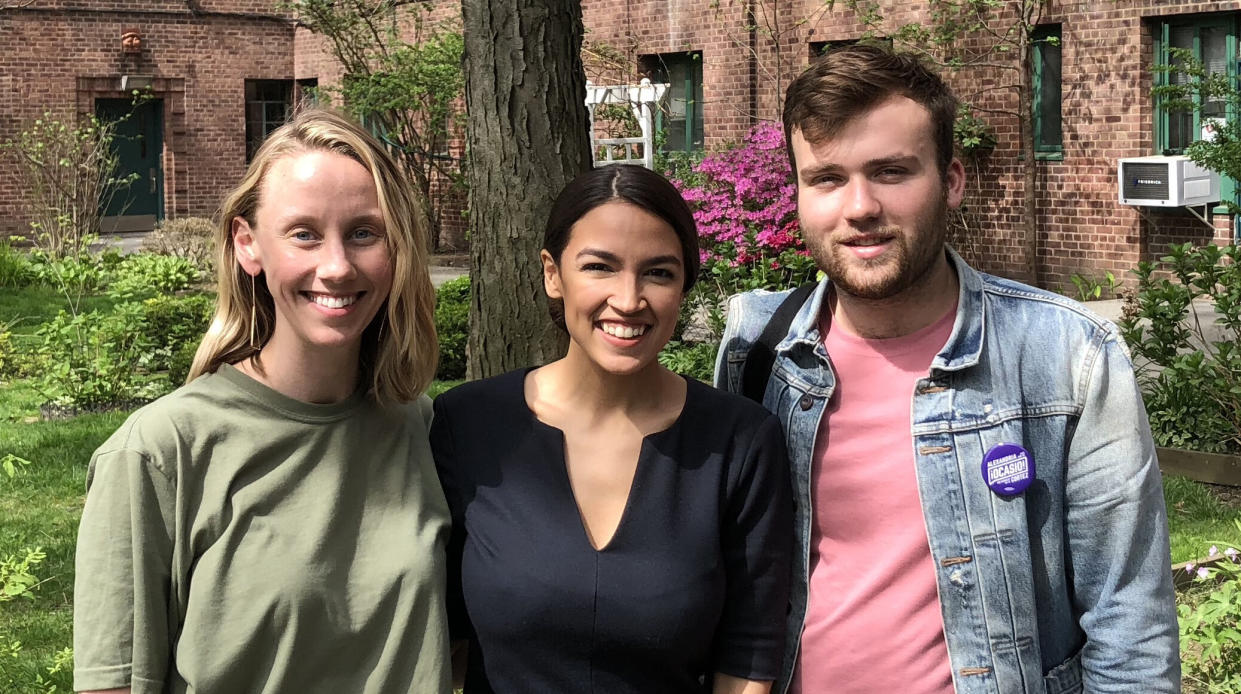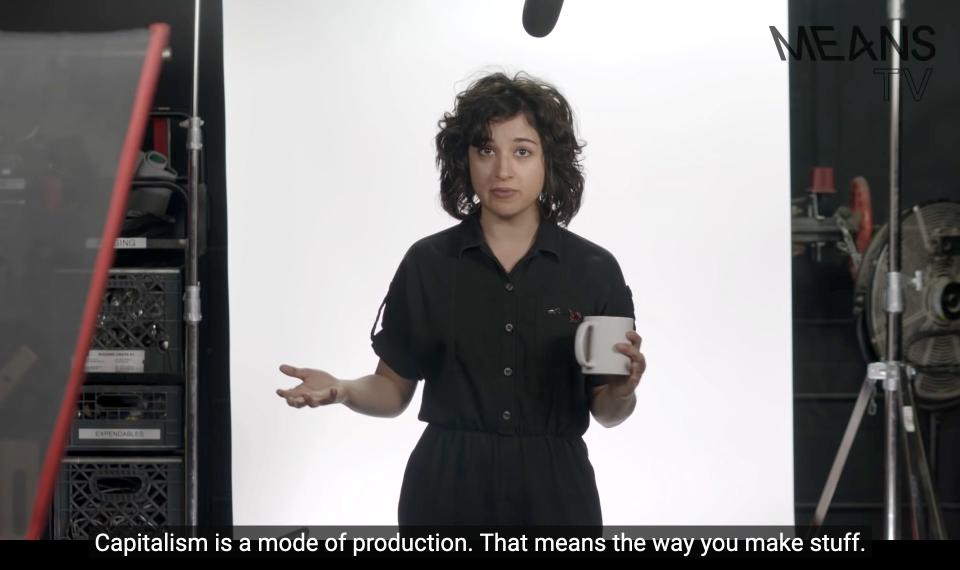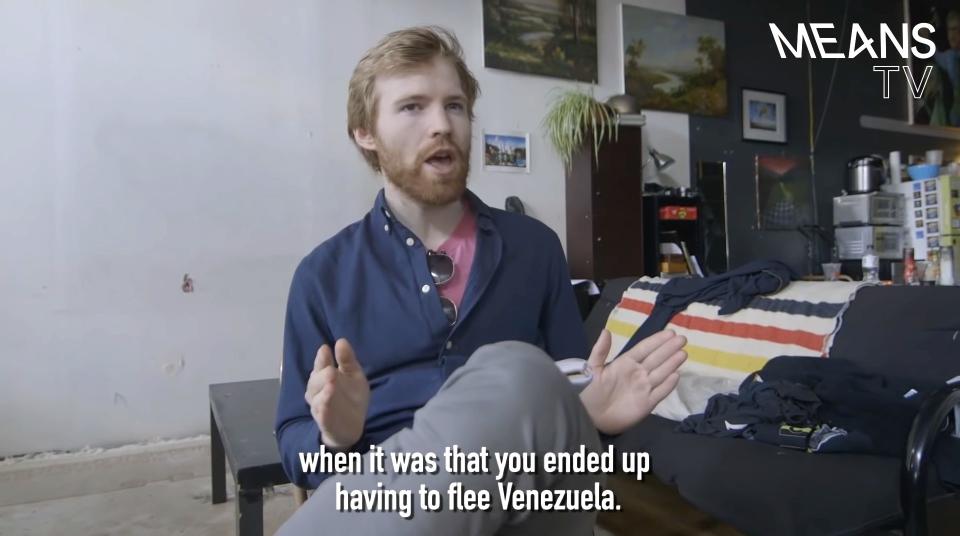The couple behind the viral AOC ad plans a streaming channel for socialists

On Tuesday afternoon, the AFL-CIO’s Twitter account posted a video of Dan Whelan, a 36-year-old roofer from Dearborn, Mich., stating that the concept of a middle class was a lie and calling for solidarity among workers. The union’s tweet, featuring the caption “We all need to seize the means of production” was derided on the right and applauded on the left, and was viewed nearly 400,000 times.
Where did the video, with its Marxist-Leninist tagline, come from? It’s part of a fundraising campaign from Means TV, a Detroit-based film company that’s attempting the ambitious project of launching its own anticapitalist streaming service. The service is an offshoot of Means of Production, which gained renown last year after producing the “Courage to Change” ad for Alexandria Ocasio-Cortez that helped propel her to an upset victory in New York’s congressional primary.
Means was founded by Naomi Burton, 29, and Nick Hayes, 22, who met at a Democratic Socialists of America gathering in late 2016. The couple began working together on video projects before founding their company in early 2017. Propelled by the success of their Ocasio-Cortez ad, they expanded their ambitions by launching Means TV, which they describe as an anticapitalist subscription streaming service to compete with Netflix, producing entertainment — comedies, animated series and documentaries — that will also function as leftist propaganda aimed at the working class. While they plan to still post shorter videos to YouTube, Twitter and Facebook, longer-form content would be available behind a paywall on its own app, like a traditional corporate streaming service.
What kind of content goes on an anticapitalist service? News coverage focusing on the perspective of individual workers, a reality show about a workplace trying to unionize, and animated shorts like this mash-up of Gay Pride Week and drone-launch missile technology.
Burton and Hayes keep overhead low by working out of their home and lean on their pre-Means experience (Burton did public relations for General Motors, Hayes worked on car commercials) to learn how to make commercially successful videos. They intend for the company to be a true collective, giving any full-time employee who works there for a minimum of two years an equal say in company decisions.
Asked if they were concerned about potentially losing control of Means in the future, Hayes said they expected to transform the company over and over again as it expanded. Burton added that their plan was to hire people who were like-minded. They’re currently the only two full-time employees but have plans to add to the payroll in the near future.
The pair admit they’re new to fundraising, and they’re lagging well behind their stated goal of half a million dollars by the end of May after launching the campaign in March. They’ve raised over $80,000, with an average donation of $33. Three-quarters of the people who have donated — or just under 1,900 — have already opted in as monthly subscribers, at a rate of $10 per month.
Burton and Hayes said they still hope to launch the service early next year, even if the offerings are scaled down from their initial plans.
“We’re just kind of out here shooting in the dark,” said Hayes of the beginning of the funding process. “To do something fully at scale is a few million dollars, and we could also achieve a level of that with $500,000, and we can do that with $100,000 too. We’re just doing the project regardless of what we raise proportional to the scale of money we raise, but it’s happening.”
While the ultimate goal for Means TV is to be anticapitalist entertainment, they’ve found some success in their teaser videos which have served as explainers for various leftist concepts. With the aid of retweets from Ocasio-Cortez, a “What is capitalism?” explainer topped 600,000 views, while a report on the Stop & Shop grocery store strike in the Northeast has more than 300,000. Burton contacted Ocasio-Cortez on Twitter before her rise to fame, when the upstart candidate had only a few thousand followers versus her current 4 million. They hashed out a plan for the ad and were in New York shooting the following month.

“I think the success of the AOC video provided a huge platform for us and shifted the Overton window that allowed us to see that there was room for anticapitalist entertainment,” said Burton.
Other successes include over 70,000 views for a video discussing resource extraction in Kentucky and 136,000 for one titled “Capitalism controls your entire life” featuring the hosts of Street Fight Radio, a self-billed "#1 anarcho-comedy show.” They have addressed single-payer health care, feminism and American foreign policy during an imperialism-themed week. While progressive politics is generally identified with the coasts, and New York- and Los Angeles-based comedians are prominently represented on the channel, Means remains a Detroit-based company with contributors in Illinois, Ohio and Kentucky. The diversity of voices is part of the rollout plan.
“Everybody we’re featuring in these videos has their own sort of audience,” said Hayes. “They’re a comedian, they’re a writer, they’re an entertainer, so each video that comes out we pull in a whole new subgroup of the left into this broader project.”
There are some in the productions with no media experience, like Whelan, described in his video as a “Marxist, Roofer.” Whelan told Yahoo News he met Burton and Hayes at Detroit DSA meetings and they asked him if he was interested in appearing in some videos, for which he was paid.
“We want to highlight people with audiences ... who should have a wider platform, but our whole thing is the only experience you need to talk about capitalism is living in the world as a working person, so what we saw [with Whelan’s video] is people are very interested in hearing from a working person about their experience,” said Burton.
Natalie Shure, a writer and researcher who narrated the Stop & Shop mini-documentary shared by Ocasio-Cortez, said that the company hopes to reach people who might not even realize what they’re looking for.
“I think it’s very possible to grow up in the United States, be a very connected, curious, intellectually rigorous person and still not be exposed to the basics of leftist politics. Our school system and culture doesn’t leave a lot of room for that so a project like this can kind of meet people where they are,” said Shure, adding that some people “don’t even know what ideas they want to know yet.”
While Ocasio-Cortez has been an ally on the left, the project has faced criticism from the right. It was the subject of a segment on Fox News (which Burton said resulted in a bump in donations) and criticized in National Review (which they linked to from their Twitter account). Means has done some criticizing of its own; it poked fun at Vice News, releasing a parody video on Wednesday that uses the company’s signature style to mock coverage of the political unrest in Venezuela. It has been viewed more than 100,000 times.
Should Means TV prove successful, it will follow the model of some other thriving leftist media. Jacobin and Dissent are examples of independent leftist magazines, while Patreon, a crowdfunding platform founded in 2013 that allows users to be “patrons” of their favorite creators, offers podcast and video creators a way to receive payments from subscribers. Natalie Wynn, a transgender woman who produces cultural and political commentary on the YouTube channel ContraPoints, has turned her videos into a full-time job, with over 9,000 donors contributing between $2 and $20 per month. The Patreons for left-wing podcasts — which have lower production costs than video — can bring in thousands of dollars every month, with the highest being Chapo Trap House, a political comedy series that brings in $130,000 per month.
But rather than tie their fate to Patreon, Burton and Hayes intend to collect subscription fees. As an independent service, Means TV wouldn’t have to worry about losing its platform based on a decision by one of the tech giants, and it would be insulated from some of the bottom-line concerns and political restrictions that characterize corporate media.

Is the potential audience large enough to sustain the project? There appears to be interest in these ideas among Democrats, and not just those on the left wing of the party. According to a 2018 Gallup poll, more Democrats had a favorable view of socialism than capitalism. Democratic socialists now occupy five of the 50 seats on the Chicago City Council. Some populist policy proposals have also polled well, with Sen. Elizabeth Warren’s wealth tax showing majority support and the Green New Deal being approved by a plurality of voters.
And the zeitgeist seems to be turning against the billionaire class. The elite Davos conference in Switzerland is losing its cachet; a Disney heiress warned a congressional hearing that “we have begun to cannibalize the very [middle-class] people that make this economy thrive.”
Besides spreading the ideology of socialism, Burton and Hayes want Means to function the way Fox News and conservative talk radio do on the right: as a coordinating hub for political messaging.
“The right is coordinating so well,” said Burton, “considering the majority of liberals think the right is just a bunch of bumbling idiots, they’re coordinating communications very well, they’re funding themselves very well. We really want to be a centralized platform for the Chapos and the Street Fights and other organizers to combat that. Because they’re doing a very good job.”
Whelan believes in the consciousness-raising potential of Means TV. “There seems to be, to me at least, a lot of discontent in contemporary American politics,” he says. “I know for myself as a real blue-collar guy, everybody I know is completely disengaged from any political process whatsoever. I can’t think of a single dude that I’ve roofed with over the past 10 years that would have ever even once a single time voted. And why is that?
“There’s something that’s been lost in the last 40 years.”
_____
Read more from Yahoo News:



